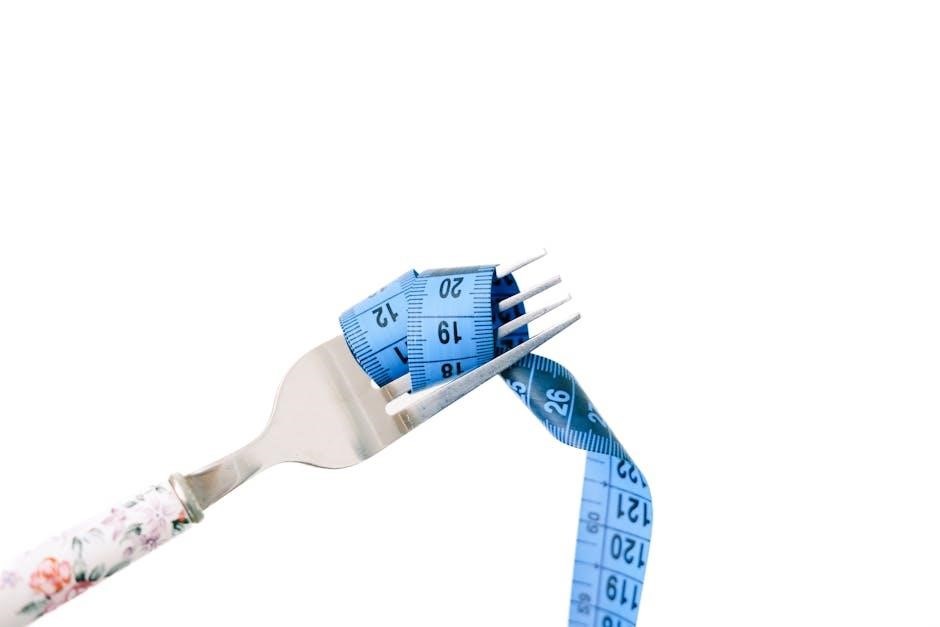The adrenal body type diet plan focuses on balancing nutrients, hydration, and meal timing to support adrenal function, promoting weight loss and overall well-being effectively.
1.1 What is the Adrenal Body Type?
The adrenal body type is characterized by weight gain in the midsection, often linked to stress and cortisol imbalances. This body type tends to store fat around the abdomen due to adrenal gland activity. People with this type may experience energy fluctuations, cravings for salty or sweet foods, and difficulty losing belly fat. Understanding this body type is crucial for tailoring a diet plan that addresses adrenal function and promotes fat loss effectively.
1.2 Importance of a Diet Plan for Adrenal Body Type
A diet plan for the adrenal body type is essential for managing cortisol levels and reducing stubborn belly fat. It helps balance macronutrients, supporting adrenal function and overall well-being. By focusing on nutrient-dense foods and proper meal timing, this plan addresses stress-related weight gain and promotes sustainable fat loss. Tailoring meals to adrenal needs can enhance energy levels, improve metabolism, and support long-term health goals effectively.
Key Principles of the Adrenal Body Type Diet
The adrenal body type diet emphasizes balancing macronutrients, staying hydrated, and timing meals to support adrenal function, promoting energy balance and weight management effectively.
2.1 Balancing Macronutrients for Adrenal Health
Balancing macronutrients is crucial for adrenal health. Protein provides essential amino acids for hormone production, while healthy fats support adrenal function and energy. Complex carbohydrates stabilize blood sugar, preventing energy crashes. A diet rich in whole foods ensures adequate vitamins and minerals, reducing adrenal strain. Proper macronutrient ratios help maintain energy levels and support overall adrenal function, promoting a balanced metabolism and weight management. Tailoring macronutrient intake to individual needs is key for optimal adrenal support and long-term health benefits.
2.2 The Role of Hydration in Adrenal Function
Hydration plays a vital role in adrenal function, as water is essential for hormone production and energy regulation. Even mild dehydration can impair adrenal function, leading to fatigue and stress. Drinking plenty of water supports adrenal balance, while inadequate hydration can disrupt hormone production. Aim for at least eight glasses of water daily, adjusting for activity levels. Proper hydration helps maintain energy levels and supports overall adrenal health, ensuring optimal bodily functions and reducing the risk of adrenal fatigue.
2.3 Timing of Meals for Optimal Adrenal Support
Eating balanced meals at consistent times supports adrenal function by stabilizing blood sugar and cortisol levels. Aim for three main meals and one or two snacks, spaced evenly throughout the day. Skipping meals can disrupt adrenal balance, leading to energy crashes and increased stress hormones. Prioritize protein and healthy fats at each meal to maintain steady energy levels. Avoid late-night eating to support adrenal recovery and promote better sleep quality, which is crucial for overall adrenal health and function.

Foods to Include in the Adrenal Body Type Diet
Foods rich in nutrients are essential for adrenal health. Focus on lean proteins, healthy fats, and complex carbs. Include colorful vegetables, whole grains, and nuts for energy and balance.
3.1 Protein Sources for Adrenal Health
Protein is crucial for adrenal health as it supports hormone production and stabilizes blood sugar. Include lean meats like chicken, turkey, and fish rich in omega-3s, such as salmon. Eggs, tofu, and legumes like beans and lentils are excellent plant-based options. Organ meats, like liver, are also beneficial due to their high nutrient content. Aim for portion sizes that meet your energy needs without overloading. Pair proteins with complex carbs to maintain balanced energy levels throughout the day.
3.2 Healthy Fats to Support Adrenal Function
Healthy fats are essential for adrenal function, as they support hormone production and energy balance. Incorporate sources like avocados, nuts, seeds, olive oil, and fatty fish such as salmon. These fats help reduce inflammation and promote nutrient absorption. Coconut oil and ghee are also beneficial for their anti-inflammatory properties. Aim to include a variety of these fats in each meal to sustain energy levels and support adrenal health effectively.
3.3 Complex Carbohydrates for Energy Balance
Complex carbohydrates are vital for maintaining energy balance and supporting adrenal function. They provide sustained energy and help regulate blood sugar levels. Include whole grains like quinoa, brown rice, and oats, as well as vegetables and legumes. These foods are rich in fiber and nutrients, promoting steady energy release. Sweet potatoes and non-starchy vegetables are excellent choices, offering natural energy without causing spikes. Incorporating these carbs in moderation ensures balanced adrenal function and prevents energy crashes.
Foods to Avoid for Adrenal Body Type

Eliminate sugary, refined, and processed foods, as well as excessive caffeine and alcohol, to protect adrenal health and prevent energy crashes and inflammation.
4.1 Sugary and Refined Foods
Sugary and refined foods disrupt blood sugar balance, leading to adrenal stress and energy crashes. These foods, such as white bread, pastries, and sweetened beverages, cause insulin spikes and inflammation. Regular consumption can overburden the adrenal glands, impairing their ability to regulate hormones like cortisol. Avoiding these foods helps stabilize blood sugar levels and supports adrenal function, promoting long-term energy balance and overall health. Opting for whole, nutrient-dense foods is essential for adrenal well-being and weight management.
4.2 Processed Foods and Their Impact on Adrenals
Processed foods, laden with preservatives, artificial additives, and excessive sodium, strain adrenal function. These foods trigger inflammation and disrupt hormone balance, leading to adrenal fatigue. Regular consumption can impair the body’s natural ability to manage stress, contributing to energy crashes and weight gain. Eliminating processed foods reduces adrenal stress, promoting better overall health and metabolic function. Focus on whole, unprocessed foods to support adrenal health and maintain stable energy levels throughout the day.
4.3 Caffeine and Alcohol Consumption
Caffeine and alcohol can negatively impact adrenal function, exacerbating fatigue and stress responses. Caffeine overstimulates the adrenal glands, potentially leading to burnout, while alcohol disrupts blood sugar balance and increases adrenal stress. Moderation is key; excessive consumption hinders weight loss and energy recovery. Limiting or avoiding these substances supports adrenal health, promoting a more balanced and resilient metabolic system. Opt for herbal teas or water to stay hydrated and avoid energy crashes associated with caffeine and alcohol.

Sample Meal Plan for Adrenal Body Type
A structured meal plan tailored to adrenal health, offering balanced options to stabilize energy, reduce stress, and promote weight loss effectively and sustainably.
5.1 Breakfast Options
Start your day with nutrient-dense breakfasts to support adrenal health. Include protein-rich options like scrambled eggs with spinach, avocado toast, or Greek yogurt with berries. Incorporate complex carbs such as oatmeal or whole-grain toast for sustained energy. Healthy fats like avocado, nuts, or seeds also play a crucial role. Avoid sugary foods and opt for herbal teas or water to stay hydrated. A balanced breakfast helps stabilize blood sugar and energy levels, setting a positive tone for the day ahead.
5.2 Lunch Ideas
For a nourishing lunch, opt for balanced meals that combine lean proteins, vegetables, and complex carbs. Grilled chicken or fish with a mix of colorful veggies, quinoa, or brown rice is ideal. Add healthy fats like avocado or nuts for adrenal support. Incorporate leafy greens and cruciferous vegetables to enhance nutrient intake. Avoid processed foods and sugary dressings. Pair your meal with a side of fresh fruit or a small salad for added fiber and hydration. Herbal teas or water complement the meal, promoting overall adrenal balance and energy.
5.3 Dinner Recipes
Dinner should focus on balanced, nutrient-dense meals to support adrenal health. Opt for baked or grilled lean proteins like salmon, turkey, or chicken, paired with steamed vegetables such as broccoli, spinach, or Brussels sprouts. Include complex carbs like sweet potatoes or quinoa for sustained energy. Add healthy fats like olive oil or avocado to enhance nutrient absorption. A side salad with fresh greens and a light vinaigrette complements the meal. Avoid heavy or processed foods to maintain adrenal balance and promote restful digestion.
5.4 Snacks for Adrenal Support
Snacks play a crucial role in maintaining adrenal health by stabilizing blood sugar levels. Opt for nutrient-dense options like raw vegetables with hummus, a handful of nuts or seeds, or fresh fruit. Protein-rich snacks such as hard-boiled eggs or a small portion of lean meats are also beneficial. Incorporate healthy fats like avocado slices or a sprinkle of chia seeds. Herbal teas or water with lemon can aid hydration and support adrenal function. Avoid sugary or processed snacks to prevent energy crashes and adrenal strain.
Exercise and Physical Activity for Adrenal Body Type
Moderate exercise supports adrenal health by reducing stress and improving energy levels. Activities like yoga, brisk walking, or swimming are ideal. Avoid over-exertion to prevent adrenal fatigue.
6.1 Importance of Moderate Exercise
Moderate exercise is crucial for adrenal health, as it helps reduce stress and improve energy levels. Activities like yoga, swimming, or brisk walking are ideal. Exercise stimulates blood flow and supports adrenal function, but over-exertion should be avoided to prevent adrenal fatigue. Consistency is key, as regular movement aids in maintaining hormonal balance and overall well-being. Incorporating physical activity into your daily routine can enhance the effectiveness of the adrenal body type diet plan.
6.2 Yoga and Stress Reduction

Yoga is a powerful tool for reducing stress and supporting adrenal health. Gentle flows, restorative poses, and breathing techniques help calm the mind and body. By lowering cortisol levels, yoga aids in balancing adrenal function. Regular practice improves energy levels, enhances flexibility, and promotes relaxation. Incorporating yoga into your routine complements the adrenal body type diet plan by addressing both physical and emotional stress, fostering overall well-being and resilience.
6.3 Avoiding Over-Exertion
Avoiding over-exertion is crucial for adrenal health, as excessive physical activity can strain the adrenal glands, leading to energy depletion and fatigue. Moderate exercise is beneficial, but pushing too hard can disrupt hormonal balance and hinder weight loss efforts. Prioritizing rest and recovery allows the body to heal and function optimally. Incorporating low-intensity activities, like walking or light stretching, supports adrenal recovery without causing burnout. Balancing activity with rest is key to maintaining energy and overall well-being.

Stress Management Techniques
Stress management is crucial for adrenal function and weight loss, as chronic stress disrupts hormones and metabolism. Techniques like meditation, deep breathing, and yoga help reduce stress effectively.

7.1 Meditation and Mindfulness Practices
Meditation and mindfulness are key stress management techniques for adrenal health. Regular practice reduces cortisol levels, improves emotional balance, and enhances mental clarity. Start with short sessions, focusing on deep breathing to calm the mind and body. Mindfulness practices, such as mindful eating, help maintain a healthy relationship with food and reduce overeating. Incorporating these practices into daily routines supports adrenal function, aids in weight loss, and promotes overall well-being. Consistency is essential for long-term benefits.
7.2 Sleep Hygiene for Adrenal Health
Sleep hygiene is crucial for adrenal health, as poor sleep disrupts cortisol balance and metabolism. Establish a consistent sleep schedule, create a restful environment, and avoid screens before bed. Limit stimulants like caffeine and alcohol in the evening. Aim for 7-9 hours of quality sleep nightly to support adrenal function, weight loss, and overall well-being. Prioritizing sleep helps regulate stress hormones, enhancing the effectiveness of the adrenal body type diet plan and promoting long-term health benefits.
7.3 Time Management to Reduce Stress
Effective time management is essential for reducing stress and supporting adrenal health. Prioritize tasks, set realistic goals, and avoid overcommitting to maintain balance. Use tools like calendars or to-do lists to organize your day. Delegate when possible and learn to say no to non-essential tasks. By managing time wisely, you can minimize stress, prevent burnout, and create space for self-care activities like meditation and exercise, which are crucial for adrenal well-being and overall success of the diet plan.

Supplements for Adrenal Support

Supplements play a crucial role in adrenal support. Key options include Vitamin C, B vitamins, magnesium, and adaptogenic herbs like Ashwagandha and Rhodiola, which help regulate stress hormones and boost energy levels naturally.
8.1 Vitamins and Minerals for Adrenal Function

Certain vitamins and minerals are vital for adrenal function. Vitamin C supports cortisol production, while B vitamins, especially B5, B6, and B12, aid in energy metabolism. Magnesium helps regulate cortisol and blood sugar balance. Additionally, zinc and selenium support hormone production and antioxidant defenses. These nutrients help maintain adrenal balance, reducing fatigue and stress. Incorporating foods rich in these vitamins and minerals, or supplementing when necessary, can significantly support adrenal health and overall well-being.
8.2 Herbal Remedies for Stress Relief
Herbal remedies offer natural solutions for stress relief, supporting adrenal health. Ashwagandha is an adaptogen that reduces cortisol and enhances energy. Rhodiola Rosea combats fatigue and improves mental clarity. Holy Basil lowers cortisol levels and uplifts mood. These herbs can be consumed as teas, supplements, or added to meals, providing a holistic approach to managing stress and promoting emotional well-being.
Monitoring Progress and Adjustments
Regularly track weight loss, energy levels, and overall well-being to ensure the diet plan is effective. Adjustments may be needed based on individual responses and goals.
9.1 Tracking Weight Loss and Energy Levels
Monitoring progress is crucial for the adrenal body type diet. Track weight loss weekly and assess energy levels daily. Note improvements in digestion, sleep, and stress resilience. Adjust portions or food choices if weight loss stalls or energy dips. Use a journal to document meals, physical activity, and how you feel. This data helps identify patterns and ensures the diet plan remains effective and tailored to your needs for sustainable results.
9.2 Adjusting the Diet Plan as Needed
As progress is monitored, adjustments to the adrenal body type diet plan may be necessary. Individual needs can change over time due to shifts in metabolism, stress levels, or activity. If weight loss slows or energy levels fluctuate, consider tweaking macronutrient ratios or incorporating new foods. Adjust portion sizes or meal timing to better suit your body’s response. Gradual changes allow the body to adapt without causing stress, ensuring the diet remains effective and sustainable for long-term adrenal health and weight management.
Conclusion
The adrenal body type diet plan offers a tailored approach to weight loss and overall well-being, focusing on nutrient balance and stress reduction for long-term success.
10.1 Summary of the Adrenal Body Type Diet Plan
The adrenal body type diet plan is a tailored approach focusing on balancing macronutrients, hydration, and meal timing to support adrenal health. It emphasizes avoiding sugary and processed foods, reducing caffeine and alcohol, and incorporating nutrient-dense meals. Regular physical activity, stress management, and adequate sleep are also key components. By following this plan, individuals can achieve weight loss, improve energy levels, and enhance overall well-being, making it a holistic strategy for long-term health benefits.
10.2 Long-Term Benefits of the Diet
The adrenal body type diet plan offers sustainable weight loss, improved energy levels, and enhanced mental clarity. By reducing stress and inflammation, it supports long-term adrenal health. Consistent adherence promotes better digestion, balanced hormones, and overall well-being. This diet not only addresses physical health but also fosters a healthier relationship with food and lifestyle habits, leading to a more vibrant and energetic life over time.


